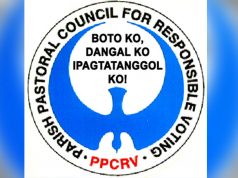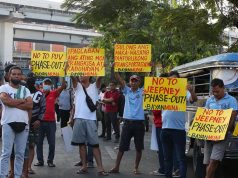The phrase “KAYUMANGGI AKO” trended on local Twitter Tuesday morning as an ordinary sari-sari store owner reminded the public that criticizing the government and holding people accountable is not a matter of political affiliation but being for the country who wants the best for Filipinos.
Facebook user Marie Dinglasan shared a live video that was initially meant to call out what she claimed a “DDS” or a diehard Duterte supporter/s who were reportedly faking accounts on Facebook.
She also addressed a certain “Karla Keirsten” who she claimed is a “DDS” who has been besmirching her online.
Dinglasan went all out in her video and decided to call out all of the “DDS” who she claimed were relentlessly bashing beauty queens and showbiz personalities for speaking up against the government. She hurled out curses in her video.
Miss Universe titleholders Pia Wurtzbach and Catriona Gray and Binibining Pilipinas International 2019 Patch Magtanong last week aired their support for the calls to junk anti-terror bill.
Local actresses like Angel Locsin, Kathryn Bernardo, Nadine Lustre, Heart Evangelista, Lauren Young and Janine Gutierrez, among others, also expressed their opposition to the passage of the bill.
Critics have raised alarm about its controversial provisions as it were seen to potentially stifle dissent and curtail constitutionally-protected civil liberties.
RELATED: Why local celebrities are joining online call to scrap Anti-Terror Bill
Dinglasan in her video also decried the surge of fake Facebook accounts, reports of public officials being involved in corruption and the stifling of constitutionally-protected civil rights in proposed legislative measures.
“Lahat ng klase ng magnanakaw, ngayon nasa Pilipinas! Magnanakaw ng FB, ng account, ng post, ng comment, ng pera, ng karapatan, ng karangalan, lahat kayo!” she exclaimed.
“Uulitin ko ah, hindi ako dilaw, hindi rin ako pula! Hindi rin ako puti, kayumanggi ako! Sasabihin mo dilawan ako, ulul! Ipinost mo, dilawan ako… magkakalat ka rin lang, ‘yung katotohanan na!” Dinglasan continued, referring to different political affiliations such as the Liberal Party and the Communist Party of the Philippines.
The former is associated with the color yellow while the latter is associated with red.
A spliced video of Dinglasan was uploaded on Twitter, where it eventually reached the local top trending list. The edited one begins around the 7:56 mark of the original video.
ALING MARIE ENDED DDS LIVES 😭😭😭😭😭 pic.twitter.com/jAn2wy23NX
— rodney john #JUNKTERRORBILL (@WOLFIERODNEY) June 8, 2020
‘Pro-Filipino’
Some of the phrases Dinglasan mentioned in her video, “kayumanggi ako,” landed on local Twitter’s top trend list as Filipinos agreed with her stance and said that opposing or criticizing the government does not necessarily translate to being a “dilawan,” a term used to originally call supporters of the Liberal Party.
However, “dilawan” has been used by trolls to bash Filipinos who criticize some of the government’s policies despite being unaffiliated with the opposition.

“It doesn’t mean you are ‘Dilawan’ when you criticize the government, our country is not divided by colors after all! We have different sides and opinions, use it better! You rock Aling Marie! KAYUMANGGI AKO!” a Twitter user said in response to the video.
Another online user quoted Dingsalan’s “kayumanggi ako” phrase and added, “As it should f**king be. We should not let political colors be the reason why we are blinded from the current situation of our country. Stan Aling Marie!!!”
“Just because (you’re) calling them out, doesn’t mean (you’re) on the opposition. IT’S JUST BECAUSE YOU SHOULD BE PRO-FILIPINO. PERIODT,” wrote another online user.
Message to all the supporters of this administration. We are not leftist nor an NPA, nor any color you want to tag us! I am a FILIPINO! Kayumanggi ako na ang gusto ay pagbabago! That someday corruption will no longer exist! And justice is not selective to those who have power! https://t.co/UlqHDVQGcO
— Ryle (@Ryle0417) June 8, 2020
Right to dissent
Filipinos have the right to speak and address their concerns and grievances to the government regardless of any political affiliation.
This is enshrined in the 1987 Philippine Constitution—considered the highest law of the land—under Article III or the Bill of Rights. Section 4 specifically states:
“No law shall be passed abridging the freedom of speech, of expression, or of the press, or the right of the people peaceably to assemble and petition the government for redress of grievances.”
Expressing dissent has also been historically associated with the citizens’ involvement in national affairs.
RELATED: ‘Mag-ingay para sa bayan’: A list of COVID-19 issues addressed after public objection
Political junkie Benjamin Morris in a 2014 opinion piece cited how dissent has paved the way for people to be granted rights such as the right to suffrage and the right for equal treatment in terms of occupations before.
“Dissent is the most important action in a functioning society,” he said.
“We must value our right to speak up, move where we please, and have security in our homes, and in our persons. If we don’t, tyranny will rain down on us swiftly, and harshly, leaving us with bodies, but no souls,” Morris added.
A professor of education in the United States’ University of Cincinnati notes that dissent is the people’s “opportunity and capacity” to determine whether the laws and systems guiding their society are “good and just.”
“Dissent allows for a proliferation of views on the good life. It sparks conversation and ignites change to better align practices and policies with the wishes and needs of the people. It keeps democracy vibrant,” Sarah
“Indeed, a flourishing democracy depends on such an informed and active citizenry who will speak out when they find laws to be unjust,” she added.










